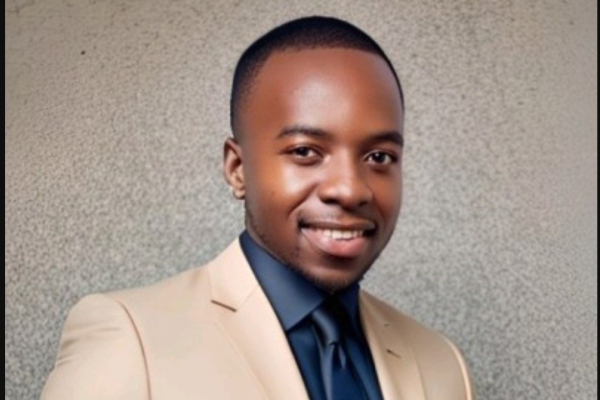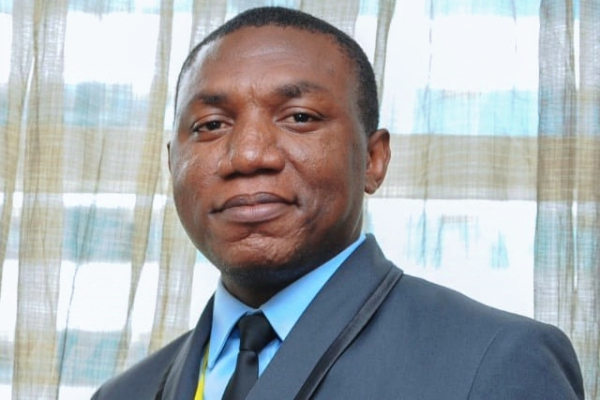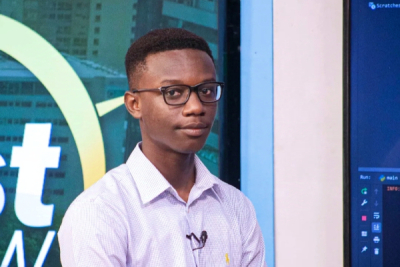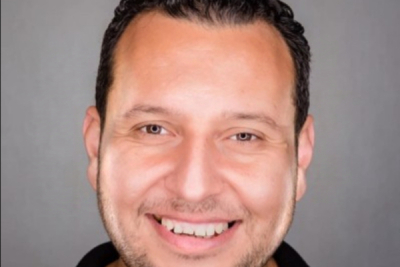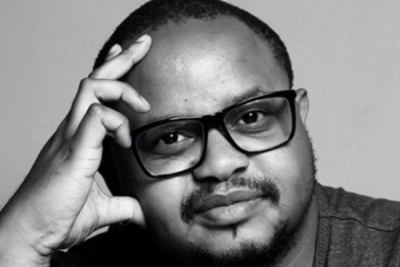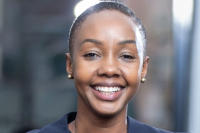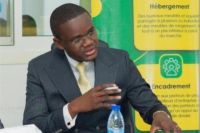
TECH STARS (1006)
A computer engineer, he leads a team of passionate designers and engineers dedicated to creating innovative products. He has already launched several technological solutions.
Charles Wisdom Kateleshi (photo) is a Zambian computer scientist and entrepreneur. He is the founder and CEO of Daylight Technologies Inc., a software development company dedicated to helping businesses of all sizes leverage technology opportunities.
Founded in 2020, Daylight Technologies Inc. offers businesses and individuals a range of modern tech tools and solutions. The company aims to create an ecosystem of high-performing enterprises, fostering growth and success. Its services include cybersecurity, data management and analysis, optimization, and cloud solutions.
Daylight Technologies Inc. provides products like Bulk SMS, a tool for sending large numbers of messages to multiple recipients simultaneously, and Bulk Email, a mass email software. The company has also developed Supernova, an online video streaming platform.
Charles Wisdom Kateleshi graduated with a bachelor's degree in computer science from Cavendish University Zambia in 2018. After his studies, he joined fintech company Nsano as a senior software engineer. In 2021, he became the managing director of Omega Records, a music label.
In January 2024, Charles was named "Founder of the Year Under 30" for Southern Africa at the FOYA Awards, an initiative recognizing young entrepreneurs contributing to the continent's development.
Melchior Koba
With over 18 years of experience, he is actively involved in the technology and entrepreneurship sectors in Africa. He contributes to the development and growth of startups across the continent.
Paul Mbua (photo) is a Cameroonian-born business consultant and investments and information technology expert. He is the founder and CEO of Zixtech Hub, a pan-African incubator and accelerator aimed at transforming ideas into businesses.
Founded in 2017, Zixtech Hub supports tech startups and equips young people with the skills, training, networks, and tools necessary to build sustainable companies. As part of the AfriLabs network, which brings together business support structures, the incubator operates in Cameroon, as well as Nigeria, Ghana, Togo, Benin, Rwanda, Ivory Coast, and Tanzania.
"We focus on the development and growth of startups to combat the rising unemployment in Africa. Our focus is on technologies we consider the cornerstones of emerging digital economies, including agriculture, entrepreneurship, and more," the company states on its website.
In 2019, Paul Mbua also founded Zixtech Corporation, where he serves as CEO. This organization connects investors with growing businesses, startups, and investment opportunities in Africa. He is also the founder of the Africa Business and Investment Summit, an event designed to encourage investments on the continent.
Additionally, he serves as the regional president for Africa at the Digital for Development Hub, a strategic platform established by the European Union to promote partnerships and stimulate investments in the digital sector. Paul Mbua is also an independent international consultant for Vital Wave, a U.S.-based tech startup, and Stantec, a Canada-based company.
Paul Mbua holds a certificate in civic leadership from the Ghana Institute of Management and Public Administration, earned in 2017. In 2020, he joined Ghana Tech Lab as a business development consultant. The following year, he became the partnerships manager for Ambitious Africa Cameroon, a volunteer group working toward the continent's development. From 2021 to 2023, he chaired AfriLabs' election commission.
Melchior Koba
He is working to mitigate the effects of climate change and strengthen Africa's agricultural sector. To do this, he's using his technological know-how.
Christian Kusi (photo) is a Ghanaian expert in the Internet of Things (IoT), artificial intelligence (AI), robotics, and cybersecurity. He is also an entrepreneur, and the founder and CEO of Climate Tech Solutions, a startup focused on agricultural technologies.
Founded in 2021, Climate Tech Solutions aims to combat global hunger and promote sustainable farming practices. The company harnesses technologies like IoT, AI, and renewable energy to transform agriculture, especially in regions hardest hit by climate change.
Through AI, the company helps farmers improve crop yields. It develops smart farms that can be automated and monitored in real time, and provides solutions to ensure a consistent water supply for agriculture.
Christian Kusi also serves as a technology consultant at The Innovation Spark, an organization supporting Africa’s startup ecosystem. Additionally, he is a STEM (Science, Technology, Engineering, and Mathematics) instructor at Firefly IO, a non-profit organization focused on passing these skills on to young people.
He graduated from Valley View University in 2023 with a bachelor's degree in computer science. Between 2022 and 2024, he worked as a STEM instructor at InovTech STEM Center, a Ghanaian organization that provides STEM training and hands-on learning experiences for students of all ages. In 2023, he interned in machine learning at minoHealth AI Labs, a pioneering AI startup in the healthcare sector.
Melchior Koba
A serial entrepreneur, he is committed to developing technological solutions for the e-commerce sector. He has already co-founded three tech startups in Egypt.
Mohamed Ezzat (photo) is an Egyptian electronics engineer and entrepreneur. He is the co-founder and CEO of Bosta, a tech startup specializing in logistics and financial solutions for e-commerce.
Founded in 2017, Bosta is an innovative logistics company offering next-day delivery and rapid transfer services to e-commerce businesses in Egypt, Saudi Arabia, and the United Arab Emirates. Its mission is to simplify shipping—whether for small documents, parcels, or large items—for businesses of all sizes.
The startup claims over 25 stores, 15,000 sellers, and 1,000 representatives. According to its website, it is "the largest transportation company for e-commerce and the number one trusted delivery partner, providing an exceptional experience on both ends, with futuristic technology that places us at the forefront of the market.”
Before founding Bosta, Mohamed Ezzat co-founded Lynks in 2014, an e-commerce company where he served as Chief Operating Officer until 2016, and remains an advisor today. His first start-up, DealGamed, an online store focused on offering a wide range of products to customers, also launched in 2014.
Ezzat graduated from the Arab Academy for Science, Technology, and Maritime Transport in 2007 with a bachelor's degree in electronics and communications engineering. Between 2008 and 2015, he worked as a technical project manager at Alcatel-Lucent, a provider of communication, networking, and cloud services for businesses, before the company's acquisition by Nokia.
Melchior Koba
She is an entrepreneur with several years of experience in the construction industry. Her goal is to help professionals in the sector enhance their performance.
Eya Hammouda, a Tunisian tech entrepreneur (photo), is the co-founder and CEO of BIMFLOW, a startup offering an immersive virtual reality (VR) platform designed for teams in the construction and real estate sectors. Founded in 2022, BIMFLOW allows construction professionals to virtually tour, collaborate, test, and revise projects in real time. The platform also optimizes workflows by automating repetitive tasks, saving time and resources, with the ultimate goal of improving efficiency in construction.
BIMFLOW’s solution, Stride, enhances teamwork by ensuring seamless collaboration across construction projects. From task delegation and progress tracking to identifying potential obstacles, Stride provides full visibility into every aspect of a project, helping teams stay on course and aligned with objectives.
In addition to her role at BIMFLOW, Hammouda is also the managing director of HK Consulting, a Tunisian firm active in the construction sector. She holds a master's degree in Energy, Environment, and Natural Resources Law from the Institut Supérieur des Sciences et Technologies de l’Environnement in Borj-Cedria, which she completed in 2012.
Hammouda began her career in 2011 as a media analyst at MediaScan, a marketing research firm. In 2012, she joined ETPPM (Entreprise de Travaux Publics Pétroliers et Maritimes), where she rose through the ranks from chief coordinator to director of marketing and business development. By 2015, she became director of public relations and marketing at Raven Prod, an audiovisual production company. In 2022, she also worked as an educational technologist at her alma mater in Borj-Cedria.
Hammouda has received numerous awards for her contributions to the industry. In 2022, she won the Workforce of the Future award at the Big 5 Impact Awards, which recognizes sustainability, collaboration, and technological advancements in the construction sector. In 2024, she was named one of the 50 finalists for Africa’s Business Heroes, a prestigious recognition celebrating Africa’s top entrepreneurs.
Melchior Koba
He actively encourages and supports the tech community in Africa. His efforts have been recognized with numerous awards and honors in his native South Africa.
Mixo Ngoveni (photo) is a South African tech entrepreneur and the founder and CEO of Geekulcha, a platform that connects information and communication technology (ICT) students with the professional world.
Founded in 2013, Geekulcha brings together young, skilled, creative, and ambitious talent in the tech sector. The platform fosters knowledge sharing and collaboration on various projects. It organizes tech events, offers training, and helps students enhance and strengthen their skills. Geekulcha also hosts hackathons and numerous tech events, providing its "geek" community with opportunities to develop digital skills. Its mission is to make South Africa’s tech ecosystem more competitive while ensuring that innovative tech solutions incorporate sustainability wherever possible.
Mixo Ngoveni holds a bachelor's degree in computer science, with a focus on business applications, which he earned in 2013 from Tshwane University of Technology. Between 2011 and 2013, he was a "Microsoft Student Partner" while also serving as an assistant at the mLab incubator. From 2018 to 2021, he was the head of Red Bull Basement in South Africa, a tech initiative from the Red Bull brand.
Ngoveni has been recognized and celebrated as one of South Africa’s top young leaders and entrepreneurs by various media outlets and organizations. Notably, he was featured in the Mail & Guardian's Top 200 Young South Africans in 2015 and was a finalist for the South African Institute of Information Technology Professionals (IITPSA) IT Personality of the Year award in 2017.
Melchior Koba
The technological revolution is steadily advancing across Africa, impacting every sector and offering numerous advantages. In the field of education, two tech entrepreneurs have developed a tailored solution specifically for schools.
Tespire is an innovative edtech solution developed by a Nigerian startup that enables schools to fully digitize their administrative systems while allowing parents to monitor every aspect of their children's education. Based in Abuja, the company was founded in 2022 by Abdulkadir Suleiman Lapai and Umar Madugu. In September 2024, Tespire announced the successful completion of a funding round, though the amount raised remains undisclosed, aimed at supporting its expansion efforts.
“Tespire’s vision goes beyond just fixing administrative issues. They are committed to using the power of data to increase access to quality education across Nigeria and other Sub-Saharan African countries, starting with local schools and scaling toward a broader national and international market,” stated Abdulkadir Suleiman Lapai.
The platform operates as a web portal where parents can directly access comprehensive school-related information, including tuition fees, class schedules, and enrollment processes. If a parent selects a Tespire-affiliated school, they can navigate to the school’s webpage from their computer, choose the application portal, and click "Go."
On the left side of the page, they select "New Applicants," fill in the necessary fields, and submit the application. If accepted, the parent receives an application number for their child. Subsequently, they can log into their dashboard to complete the enrollment process.
Access to Tespire's services incurs a fee. The startup offers various subscription plans for schools to join its partner database, with options starting at 2,000 naira (approximately $1.21), 2,500 naira, and higher. Tespire has ambitious plans for growth, aiming to expand its reach across Nigeria and into other countries within the region.
Adoni Conrad Quenum
She has over 17 years of experience in media, communication, and technology. She also supports the creation and development of high-impact tech companies in Africa.
Irene Phoebe Kiwia (photo), a Tanzanian tech entrepreneur based in South Africa, is the co-founder and Chief Growth Officer of Adanian Labs, a high-impact tech venture studio that drives digital transformation across Africa. Founded in 2020, Adanian Labs focuses on the creation, development, and scaling of tech startups, emphasizing innovation in areas such as artificial intelligence (AI), blockchain, and the Internet of Things (IoT). The studio provides expert software engineering support to help startups develop tailored solutions and has successfully created over 40 tech startups to date.
In addition to startup creation, Adanian Labs enhances the capabilities of tech teams through training programs in software development, data science, IoT, AI, and blockchain. These offerings include short courses, boot camps, and masterclasses. The studio also provides a comprehensive suite of services, including legal support, accounting, financial planning, technology management, human resources, and marketing.
Irene Kiwia is a member of Top Tier Impact, a global ecosystem of investors and entrepreneurs, and serves as the Tanzanian ambassador for the Women in Africa Initiative. She is also on the advisory board of African Women in Energy and Power.
Before co-founding Adanian Labs, Kiwia established Frontline Media Africa in 2006, a pan-African media and communications firm focused on technology. In 2017, she launched Twaa, an AI-powered knowledge-sharing and mentorship platform for women and girls in Africa. In 2019, she founded eCOBba, an AI-driven fintech company, and in 2021, she established The Africa Blockchain Center, a Web 3 company specializing in blockchain skills and solutions development.
Kiwia holds a bachelor’s degree in International Relations and Public Administration from the University of Dar es Salaam (2004) and a master’s degree in Marketing (2011). In 2015, she was named Africa Woman of the Year by Africa Reconnect, a pan-African platform dedicated to women's empowerment and girls' education.
Melchior Koba
He is an expert in supporting and financing innovation in Africa. He runs a startup incubator in the Republic of the Congo.
Dexter Trésor Omono is a Congolese entrepreneur and businessman. He is the founder and CEO of Kosàla, an organization dedicated to supporting innovative startups in Africa.
Founded in 2020, Kosàla helps develop startups and small and medium-sized enterprises (SMEs) in Central Africa, guiding them from the ideation stage to project realization. The organization offers its expertise and network to assist these companies in securing the necessary funding for success. While Kosàla is open to all types of projects, it places particular emphasis on technological and environmental initiatives. The organization provides a structured approach to help entrepreneurs, from data collection to analysis, facilitating effective decision-making. To date, Kosàla has received 16,450 requests for support and has backed 4,186 projects, 3,136 of which were led by women.
Dexter Trésor Omono also serves as an observer on the Local Development Council at the French Embassy in Congo. He is a consultant for the World Bank’s Digital Transformation Acceleration Project and is part of the scientific team of the National Digital Summit, which is affiliated with Congo’s Ministry of Posts, Telecommunications, and the Digital Economy.
Omono holds a technical diploma in human resource management from the Institute of Advanced Management Studies, obtained in 2011. In 2021, he earned a postgraduate diploma in project management from the Canadian Academy of Management and Technology, followed by a master’s degree in international trade from HEC Morocco in 2022.
His career began in 2011 at Escom Group, an investment management firm in Congo, where he worked as a logistics officer. In 2018, he joined Oukaley, a crowdfunding platform for sub-Saharan Africa, as the representative for Congo and the DRC. In 2021, he became a specialist consultant for the International Association of Francophone Mayors.
Melchior Koba
She earned her university degree in France. After several years of experience in the financial sector, both in France and Africa, she established her own fintech company.
Magalie Gauze-Sanga is a Cameroonian economist and entrepreneur, serving as the founder and CEO of Koree, a rewards application aimed at fostering customer loyalty in Francophone Africa.
Founded in 2022, Koree enables users to create digital loyalty cards that allow merchants to credit cashback and provide change. The platform addresses the persistent issue of small change shortages prevalent in Francophone Africa and supports various payment methods, including cash, mobile money, and bank cards.
The inspiration for the app struck Gauze-Sanga after she faced a shortage of change while purchasing pastries at a bakery in Abidjan, Côte d'Ivoire. "Working in the payments industry in sub-Saharan Africa allowed me to refine my idea for digital cards similar to an 'Apple Wallet' that could tackle this problem. I aimed to incorporate several additional services to simplify life for consumers and enhance their purchasing power, such as earning cashback," she explained in April 2024.
In January 2024, Koree secured $200,000 in pre-seed funding to facilitate its expansion throughout Francophone Africa, enhance its merchant network, broaden its user base, and tailor the product to meet market demands.
Gauze-Sanga also serves on the board of African Women in FinTech & Payments (AWFP). She holds a master's degree in industrial economics from Paris 1 Panthéon-Sorbonne University and a master's in management from Em Lyon Business School.
Her professional journey began in 2012 at BGFIBank Cameroon, where she interned in private wealth management. In 2013 and 2014, she worked as an assistant in private banking at ODDO BHF, a financial group based in France. In 2015, she became a consultant at PayPal and transitioned to a research analyst role at BNP Paribas in 2016.
In 2019, Gauze-Sanga was appointed head of financial services for e-commerce startup Jumia in Francophone West Africa. From January to June 2021, she held the roles of COO and later CMO at Ivorian fintech Julaya. Subsequently, from July 2021 to November 2022, she managed payments for Ivorian online commerce startup ANKA.
In 2023, she became the first woman to win the Ecobank Fintech Challenge, earning a prize of $50,000.
Melchior Koba
More...
With over a decade of experience in the African financial sector, he is a seasoned computer scientist specializing in fintech. He has already created three fintech companies.
Stone Atwine (photo) is a Ugandan computer scientist and tech entrepreneur. He is the co-founder and CEO of Eversend, a fintech startup.
Founded in 2017 with Ronald Kasendwa, Eversend offers an all-in-one payment platform specializing in cross-border mobile money transfers, virtual cards, bill payments, and cryptocurrencies, particularly serving expatriates. The platform allows users to manage money via cryptocurrencies, using APIs (Application Programming Interfaces), enabling easy payments and currency exchanges.
"For Africans and Africans in the diaspora that experience inconvenient and expensive financial services and hidden fees, Eversend is a one-stop financial services hub that provides a multi-currency wallet allowing them to exchange, save and send money at the best possible rates, while offering personal loans, payments, investments and and other financial services," said Stone Atwine in 2020.
Today, the company supports nine currencies and boasts over 700,000 satisfied users. It operates in Uganda, Kenya, Nigeria, Ghana, France, the UK, and the United States.
Before founding Eversend, Stone Atwine co-founded two other startups in 2013: Useremit and Yetu Credit Finance. Useremit facilitates international money transfers, particularly for those in rural Africa, often underserved by traditional banking services. Yetu Credit Finance, a microfinance company, provides salary loans to Ugandan civil servants. He served as its managing director from its inception until 2017.
Atwine holds a bachelor's degree in computer science from Mbarara University of Science & Technology in Uganda, earned in 2004. Before diving into entrepreneurship, he worked for Payment Solutions International, a fintech firm based in South Africa, where he was responsible for the company’s business development in Uganda and served as the country manager for Kenya.
In 2015 and 2016, Atwine was recognized by the Choiseul Institute in Paris as one of the top African leaders under 40 to watch for his contributions to the continent's economic development. In 2017, the French government named him an exceptional talent in entrepreneurship.
Melchior Koba
After several years in the United States, he returned to Senegal to contribute to national development. He is using technology to modernize and revitalize the real estate sector.
Papa Kane (photo) is the founder and CEO of Kanimmo, a startup he launched in 2023 with the aim of revolutionizing property management in Senegal. Kanimmo is a tech platform designed for rental property owners and real estate agencies, simplifying and enhancing property management. It helps reduce administrative tasks, improve tenant relations, and make financial transactions more transparent.
“Kanimmo helps real estate agencies optimize their operations by automating up to 85% of their activities, reducing daily time-consuming administrative tasks and the resources required to complete them. Our mission is to save you time and money so you can focus on what matters most: growing your business, retaining property owners, and expanding your rental portfolio,” the startup explains.
In addition to his role at Kanimmo, Papa Kane also heads programs at Senstartup, an independent association promoting a favorable environment for the growth of start-ups in Senegal. Founded in 2018 by entrepreneurs and digital professionals, Senstartup plays a key role in supporting innovation.
Kane holds a bachelor’s degree in leadership and management from Franklin University in the U.S., earned in 2015. During his studies, he worked as a computer lab assistant at the university. In 2014, he joined HKT Teleservices, a tech company, first as a sales trainer, later becoming recruitment coordinator and senior recruiter.
Upon returning to Senegal in 2020, he became vice president of business process management at Digital Ubuntu, a company offering online learning solutions for teaching communities.
Melchior Koba
He is committed to helping African businesses secure the funding they need to grow. Based in Europe, he connects Western investors seeking to diversify their portfolios with African ventures.
Alain Nkurikiye (photo) is a Burundian-born social entrepreneur specializing in the finance sector. He is the founder and CEO of Wajenzi, a digital platform created to address the lack of investment in sustainable startups in Africa.
Founded in 2017 in the Netherlands, Wajenzi’s mission is to promote investment in African businesses. The platform connects innovative companies with individual and institutional investors in Europe and the United States, facilitating equity financing. Wajenzi offers a range of innovative financial tools that enable direct equity stakes in African startups. This not only accelerates the growth of small and medium-sized enterprises (SMEs) but also helps drive economic development.
“Africa, representing only 1% of the global stock market, is a largely untapped resource. Wajenzi is revolutionizing the scene by enabling African startups to access long-term capital from European retail investors. We offer a distinctive platform for investors seeking to diversify their portfolios and contribute to African entrepreneurship,” Alain Nkurikiye explained in March 2024.
In addition to his role at Wajenzi, Nkurikiye serves as a startup financing consultant for the African Development Bank Group. He graduated from Lumière University of Bujumbura with a bachelor's degree in business administration in 2004 and earned a master's in business strategy and economic policy from Maastricht School of Management in the Netherlands in 2010.
Before venturing into entrepreneurship, he worked as a consultant for various organizations, including the International Trade Centre, the United Nations Population Fund (UNFPA), and the Maastricht School of Management. From 2022 to 2024, he held the position of expert in inclusive entrepreneurship at Dorcas, a Dutch organization dedicated to fighting poverty.
Melchior Koba
He aims to help tech entrepreneurs bring their innovative ideas to life and achieve their dreams. He has already invested in several startups in Africa.
Kwamena Afful (photo) is a lawyer by training, a businessman, and an investor from Ghana. He is the co-founder and CEO of PAVE Investments, where he focuses on investing in tech startups across Africa.
Founded in 2014, PAVE Investments is an investment platform that provides capital, strategic access, and resources to those creating opportunities to promote African talent on a global scale. The company also works with international businesses to help them succeed on the African continent.
PAVE primarily targets tech startups, supporting entrepreneurs in building their businesses. Among its investments are Nigerian fintech companies PaySack and Flutterwave, as well as Kenyan e-commerce platform MarketForce.
In addition to his role at PAVE, Kwamena Afful co-founded and is a partner at Microtraction, a Nigerian venture capital firm established in 2017. Microtraction provides pre-seed and seed funding to early-stage tech startups. He is also a co-founder and partner at MAGIC Fund, a venture capital fund launched in 2018, dedicated to supporting high-growth startups.
Afful holds dual bachelor’s degrees in law and in finance and international business from the University of Sydney in Australia. From 2004 to 2006, he worked as an accountant at First Data Corporation, an Australian fintech. In 2008, he joined the law firm Allens as a financial analyst, and from 2009 to 2013, he served as a team leader at Bain & Company, an international consulting firm.
Melchior Koba


